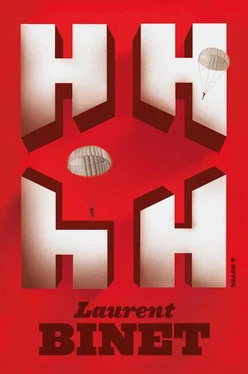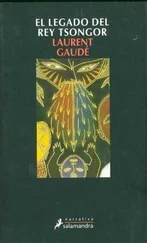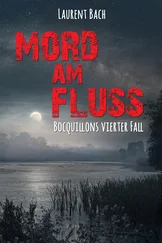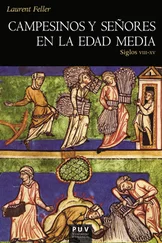Heydrich is building a security service for all the occupied sectors. The Wehrmacht is causing him problems in this regard, but these difficulties tend to smooth themselves out. The longer this goes on, the more the Wehrmacht shows itself incapable of dealing with these questions.
Heydrich has experience with certain parts of the Wehrmacht: they are not sympathetic to National Socialist politics, nor to a National Socialist war. As for leading the people, they understand nothing at all.
On February 16, Lieutenant Bartos, head of Operation Silver A, sends a message to London. The message is sent via the transmitter Libuse, the machine his group parachuted into the country the same night as Gabčík and Kubiš. Reading this message gives us a good idea of the difficulties encountered by the parachutists in the fulfillment of their secret mission:
The groups that you send should be given plenty of money and dressed suitably. A small-caliber pistol and a towel—difficult to find here—are very useful. The poison should be carried in a smaller tube. Depending on the circumstances, you should send the groups to areas away from those where they have to report. This makes it more difficult for the German security services to find them. The biggest problem here is finding work. Nobody will hire you unless you have a work permit. Anyone who does have one is given a job by the Work Office. The danger of forced labor increases greatly in the spring, so we can’t commit a greater number of men to secret missions without also increasing the risk that the entire system will be discovered. That’s why I consider it more beneficial to use those already here to the maximum, and to limit the arrival of new men to an absolute minimum. Signed, Ice.
Goebbels’s diary, February 26, 1942:
Heydrich sends me a very detailed report on the situation in the Protectorate. It hasn’t really changed. But what stands out very clearly is that his tactics are the right ones. He treats the Czech ministers as his subjects. Hacha puts himself completely at the service of Heydrich’s new politics. As far as the Protectorate is concerned, nothing more needs to be done at the moment.
Heydrich does not neglect his cultural life. In March, he organizes the greatest cultural event of his reign: an exhibition entitled Das Sowjet Paradies, inaugurated by the vile Karl Frank, in the presence of the old president Emil Hácha and the infamous collaborator Emanuel Moravec.
I don’t know what the exhibition is like exactly, but the idea is to show that the USSR is a barbaric, underdeveloped country with disgraceful living conditions, while underlining the intrinsic perversity of Bolshevism. It is also a chance to praise the German victories on the Eastern Front. Tanks and other military hardware taken from the Russians are exhibited like trophies.
The exhibition lasts four weeks and attracts half a million visitors, among them Gabčík and Kubiš. This is probably the first and only time that our heroes will see a Soviet tank.
To begin with, this seemed a simple-enough story to tell. Two men have to kill a third man. They succeed, or not, and that’s the end, or nearly. I thought of all the other people as mere ghosts who would glide elegantly across the tapestry of history. Ghosts have to be looked after, and that requires great care—I knew that. On the other hand, what I didn’t know (but should have guessed) is that a ghost desires only one thing: to live again. Personally, I’d like nothing better, but I am constrained by the needs of my story. I can’t keep leaving space for this ever-growing army of shadows, these ghosts who—perhaps to avenge themselves for the meager care I show them—are haunting me.
But that’s not all.
Pardubice is a town in eastern Bohemia. The Elbe runs through it. The town has a population of about 90,000 and a pretty square in the center with some handsome Renaissance-style buildings. It is also the birthplace of Dominik Hašek, the legendary goaltender and one of the greatest ice-hockey players of all time.
There is a fairly chic hotel-restaurant here called Vaselka. This evening, as every other evening, it is full of Germans. The men of the Gestapo sit around a table, making a lot of noise. They’ve had lots to eat and drink. They hail the waiter. He comes over, smart and obsequious. I imagine they want some brandy. The waiter takes their order. One of the Germans puts a cigarette to his lips. The waiter takes a lighter from his pocket and, with a bow, offers the German a light.
The waiter is very handsome. He was hired recently. Young, smiling, clear-eyed, and honest-looking, he has fine features on a large face. Here, in Pardubice, he answers to the name of Mirek Šolc. At first glance, there is no reason why we should be interested in this waiter. Except that the Gestapo is interested in him.
One fine morning, they summon the hotel boss. They want information on Mirek Šolc: where he comes from, who he hangs out with, where he goes when he’s not at work. The boss replies that Šolc comes from Ostrava, where his father runs a hotel. The policemen pick up the phone and call Ostrava. But nobody there has ever heard of a hotelier called Šolc. So the Gestapo of Pardubice summon the hotel boss again, and Šolc with him. The boss comes on his own. He explains that he fired the waiter because he broke some dishes. The Gestapo let him go, and have him followed. But Mirek Šolc has vanished forever.
Between them, the parachutists operating in the Protectorate would have used an incalculable number of false identities. Mirek Šolc was one of them. Now we must turn our attention to the man who used this identity—because he plays an important role in this story. His real name is Josef Valčík. And, unlike Mirek Šolc, this is a name you need to remember. So Valčík is the handsome twenty-seven-year-old man who worked as a waiter in Pardubice. Now he’s on the run, attempting to reach Moravia so he can take a break at his parents’ country house. Valčík, like Kubiš, is Moravian—although that is not the most important thing they have in common. Sergeant Valčík was in the same Halifax that carried Gabčík and Kubiš over their homeland on the night of December 28. He belonged to another group (code name Silver A), whose mission was to be dropped with a transmitter (code name Libuse) in order to reestablish contact between London and A54—the German superspy with his priceless information—through the intermediary of Morávek: the last of the Three Kings, the Resistance chief with the severed finger.
Naturally, nothing went as planned. During the jump, Valčík became separated from his colleagues and had terrible difficulties retrieving the transmitter. Having tried to transport it on a sled, he ended up reaching Pardubice in a taxi. There, local agents found him work as a waiter: this provided him with excellent cover, and the fact that the restaurant was so popular with the Gestapo tickled his sense of irony.
Unfortunately, his cover is now blown. But, in a way, this misfortune forces him to go to Prague—where two other parachutists are waiting for him, along with his destiny.
If this were a novel, I would have absolutely no need for Valčík. He is more of an encumbrance than anything else—a pointless copy of the two heroes, even if he does prove himself just as cheerful, optimistic, courageous, and likable as Gabčík and Kubiš. But it’s not up to me to decide what Operation Anthropoid needs. And Operation Anthropoid is definitely going to need a lookout.
The two men know each other. They’ve been friends since England, where they underwent the same training with the special forces of the SOE, and perhaps even since France, where they might have met in the Foreign Legion or in one of the divisions of the Czech liberation army. They also share the same Christian name. But, shaking hands with unconcealed joy, they introduce themselves as follows:
Читать дальше












